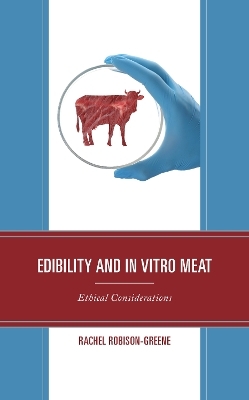
Edibility and In Vitro Meat
Ethical Considerations
Seiten
2022
Lexington Books (Verlag)
978-1-7936-1466-7 (ISBN)
Lexington Books (Verlag)
978-1-7936-1466-7 (ISBN)
This book considers the arguments for and against the implementation of in vitro meat technology. Rachel Robison-Greene argues that in light of emerging technology, we should rethink the ethical dimensions of what makes something “edible.”
Consumers and policy makers have unprecedented choices to make in the years to come about how and what we eat. If we continue down our current path of food production, we risk ever-increasing levels of animal exploitation, environmental destruction, biodiversity loss, and challenges to human health. In vitro meat production, or the process of growing meat in a lab, has the potential to reduce the severity of these problems. This proposal would change our food systems dramatically. Edibility and In Vitro Meat: Ethical Considerations explores the ethical questions that it’s important to ask every stage of this process. Rachel Robison-Greene considers arguments for and against the production of in vitro meat, as well as challenges for implementation. She argues that in vitro meat should be implemented and that we should re-think how we use the term “edible.”
Consumers and policy makers have unprecedented choices to make in the years to come about how and what we eat. If we continue down our current path of food production, we risk ever-increasing levels of animal exploitation, environmental destruction, biodiversity loss, and challenges to human health. In vitro meat production, or the process of growing meat in a lab, has the potential to reduce the severity of these problems. This proposal would change our food systems dramatically. Edibility and In Vitro Meat: Ethical Considerations explores the ethical questions that it’s important to ask every stage of this process. Rachel Robison-Greene considers arguments for and against the production of in vitro meat, as well as challenges for implementation. She argues that in vitro meat should be implemented and that we should re-think how we use the term “edible.”
Rachel Robison-Greene is assistant professor of philosophy at Utah State University.
Chapter 1: In Vitro Meat: A Moral Revolution?
Chapter 2: Can They Suffer? Utilitarian Considerations
Chapter 3: Why Not In Vitro Meat?
Chapter 4: Subjects of Lives and Inherent Value
Chapter 5: Non-Ideal Theory and Paradigm Shifts
Chapter 6: The “Yuck” Factor, Aesthetics, and Cognitive Bias
Chapter 7: Edibility and Eating Others
Chapter 8: Beings and Bodies
Chapter 9: Pandemics and Animal Exploitation
| Erscheinungsdatum | 28.10.2022 |
|---|---|
| Verlagsort | Lanham, MD |
| Sprache | englisch |
| Maße | 162 x 236 mm |
| Gewicht | 435 g |
| Themenwelt | Geisteswissenschaften ► Philosophie ► Ethik |
| Sozialwissenschaften ► Soziologie | |
| ISBN-10 | 1-7936-1466-0 / 1793614660 |
| ISBN-13 | 978-1-7936-1466-7 / 9781793614667 |
| Zustand | Neuware |
| Haben Sie eine Frage zum Produkt? |
Mehr entdecken
aus dem Bereich
aus dem Bereich
unsere kollektive Verantwortung
Buch | Hardcover (2023)
wbg Theiss in Wissenschaftliche Buchgesellschaft (WBG) (Verlag)
CHF 46,90


